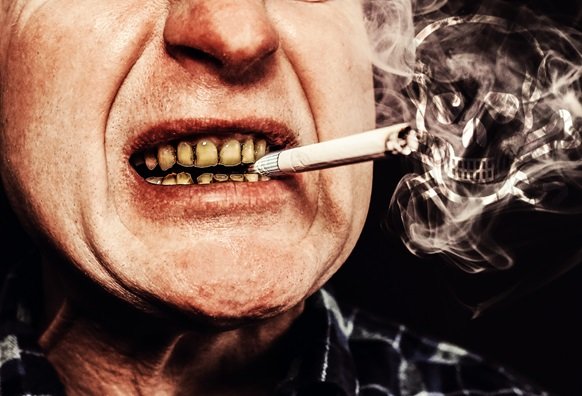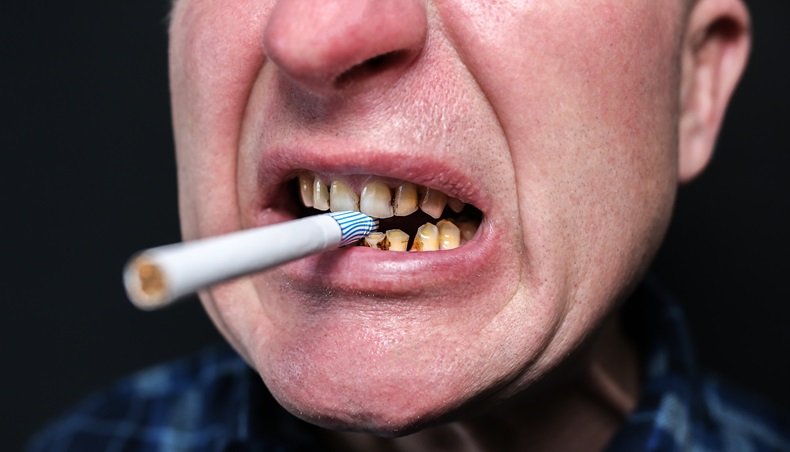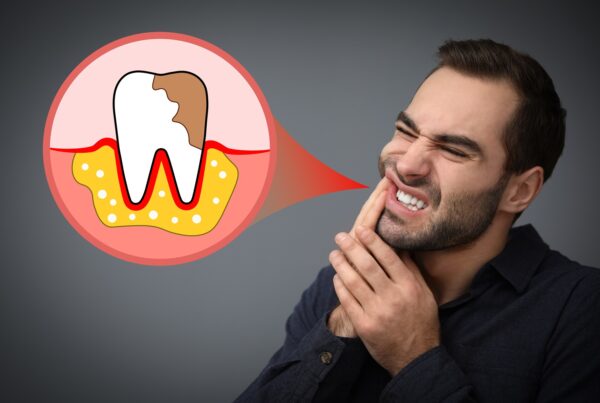Teeth of Smokers: Understanding the Problem
Smoking has long been known to have a wide range of detrimental effects on health, and oral health is no exception. The impact of smoking on the teeth of smokers and gums is profound, contributing to a variety of dental problems.
From discoloration and bad breath to more serious conditions like gum disease and oral cancer, the consequences of smoking extend beyond general well-being and deeply affect one’s oral hygiene and appearance. Understanding these side effects underscores the importance of maintaining good oral hygiene and the benefits of quitting smoking for overall oral health.

How Does Smoking Impact Your Teeth and Oral Health?
Smoking poses significant risks to overall health, but its effects on oral health are particularly severe.
The chemicals in tobacco products can have damaging consequences for the teeth and gums, leading to a range of dental problems that can affect both appearance and function.
Understanding these impacts on teeth of smokers highlights the importance of oral care and the benefits of quitting smoking.
- Tooth Discoloration: Smoking causes the smokers teeth to become yellow or brown due to the nicotine and tar in tobacco. This staining is often difficult to remove with regular brushing and may require professional whitening treatments.
- Bad Breath: The substances in tobacco contribute to persistent bad breath, often referred to as “smoker’s breath.” This unpleasant odor is caused by the accumulation of smoke particles and bacteria in the mouth.
- Increased Plaque and Tartar: Teeth of smokers tend to accumulate more plaque and tartar on their teeth compared to non-smokers. The buildup of these substances can lead to more serious dental issues, such as gum disease.
- Gum Disease: Smoking impairs blood flow to the gums, which reduces their ability to heal and fight infections. This makes teeth of smokers more susceptible to gum disease (periodontitis), which can result in gum recession, pockets between the smokers teeth and gums, and ultimately, tooth loss.
- Delayed Healing: Teeth of smokers experience slower healing times after dental procedures or injuries. This is due to the impaired immune response and reduced blood flow caused by smoking, which can complicate recovery and increase the risk of complications.
- Oral Cancer: Smoking is a major risk factor for oral cancer. The carcinogens in tobacco can lead to the development of malignant lesions in the mouth, including the lips, tongue, cheeks, and throat.
- Reduced Sense of Taste: Smoking can dull the taste buds, leading to a decreased sense of taste and making food less enjoyable. This can affect dietary choices and overall nutrition.
- Increased Risk of Tooth Loss: The combination of gum disease, plaque buildup, and weakened oral tissues significantly increases the risk of loss of teeth of smokers.
- Dry Mouth: Smoking can reduce saliva production, leading to dry mouth (xerostomia). Saliva is crucial for oral health as it helps neutralize acids, wash away food particles, and protect against tooth decay and infections.
How To Combat Bad Breath From Smoking
Combating bad breath caused by smoking involves a combination of oral hygiene practices and lifestyle changes. Here are some effective strategies to improve teeth of smokers:
- Brush and Floss Regularly: Brush your smokers teeth at least twice a day with fluoride toothpaste and floss daily. This helps remove food particles and plaque, which can contribute to bad breath. Consider using a toothbrush with a built-in tongue scraper to clean the tongue as well.
- Use Mouthwash: Rinse with an antibacterial mouthwash to help kill odor-causing bacteria. Mouthwashes containing chlorhexidine, cetylpyridinium chloride, or essential oils can be particularly effective.
- Stay Hydrated: Drinking plenty of water throughout the day helps keep your mouth moist and promotes saliva production. Saliva is essential for washing away food particles and bacteria that cause bad breath.
- Chew Sugar-Free Gum: Chewing sugar-free gum can stimulate saliva production, which helps neutralize and wash away odor-causing substances in the teeth of smokers. Look for gums with xylitol, which also helps reduce bacteria in the mouth.
- Quit Smoking: The most effective way to combat bad breath from smoking is to quit. Smoking not only contributes to bad breath but also affects overall oral health. Seek support and resources to help you quit smoking.
- Regular Dental Checkups: Visit your dentist regularly for cleanings and checkups. Your dentist can identify and address any oral health issues, such as gum disease or tooth decay, that may be contributing to bad breath.
- Use a Tongue Scraper: A tongue scraper helps remove bacteria and dead cells from the surface of your tongue, which can be a source of bad breath. Incorporate this into your daily oral hygiene routine.
- Eat Fresh, Crunchy Foods: Foods like apples, carrots, and celery can help freshen your breath and clean your smokers teeth naturally. They stimulate saliva production and help remove food particles.
- Avoid Certain Foods and Beverages: Limit your intake of foods and drinks that can exacerbate bad breath in teeth of smokers, such as coffee, alcohol, and spicy foods. If you consume these items, rinse your mouth with water afterward.
- Maintain Overall Oral Health: Address any underlying dental issues such as cavities or gum disease, as these can contribute to persistent bad breath.
Conclusion
Smoking has a profound and detrimental impact on oral health, leading to a range of issues from tooth discoloration and bad breath to more serious conditions like gum disease and oral cancer. The consequences of smoking extend far beyond superficial effects, affecting the overall health and functionality of the smokers teeth and gums.
Addressing these problems involves not only adopting effective oral hygiene practices but also considering cessation as a critical step towards improving oral health.
For those seeking professional guidance and care, American Dental Practices offers comprehensive dental services to help manage and mitigate the effects of smoking on oral health.
Our expert team can provide personalized treatment plans to address existing issues and support you in maintaining optimal dental health. Schedule a consultation today with us our dental experts to solve the smokers teeth problem!






